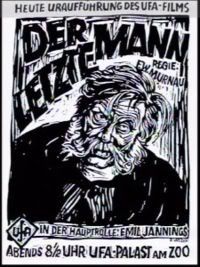
In what might be the earliest, cinematic look at the cruelties of the corporate world, F. W. Murnau weaves a dark, yet endearing tale about a veteran hotel porter. The unnamed porter (Emil Jennings) treats his job as if he were a member of royalty. With a spangled suit that would make any four-star general jealous and a countenance that practically demands to be stamped onto currency, he's greeted with respect and admiration by all those who see him. He scolds miscreant children on the street and bows to housewives with an air of noblesse oblige. Truly, this is a man who is proud of the fact that he's looked up to for the uniform he wears.
Ah, but cruel fate strikes as the hotel manager views the aged porter as a liability and replaces him with a more virile man and assigns the porter to a job more accommodating to a man of increasing years - washroom attendant. Now I'm unsure whether the "shame" of such a job is exaggerated for the sake of melodrama (as is much in silent films) or whether it really was a profession that was viewed as the lowest of the low in Germany shortly after the turn of the century. Whatever the reason, Jannings loses his regal stance when stripped of the uniform and takes on the posturing on a broken dog, which, for the better part, is an apropos physical transformation. The rest of the story follows the former porter as he sinks lower and lower in life, from stealing his uniform back by night to facing the shame and laughter of his neighbors, coworkers and wife, and finally binge drinking.
The movie instills a sense of utter hopelessness until the ending comes where the porter's tale has a happy ending. If it feels contrived, it is, as an on-screen warning to the viewer indicates. Faulty ending aside, the film is still impressive for two reasons: the first being that "The Last Laugh" is one of the first movies to utilize a moving camera. Silent films typically have a camera locked into position for a shot and if a different angle is desired, you cut to another locked angle. Murnau's camera pans along with the porter's walks of pride and shame in what could be considered early tracking shots. The second is that the hotel and its streets is actually a tremendous set - something I would have never guessed had I not found it out upon later investigation. Never for a moment do you suspect that Murnau is filming anywhere but an expansive, German hotel. While silent films may lack the technical prowess of modern cinema, that's still one of those feats that makes you just say "Wow!"

No comments:
Post a Comment